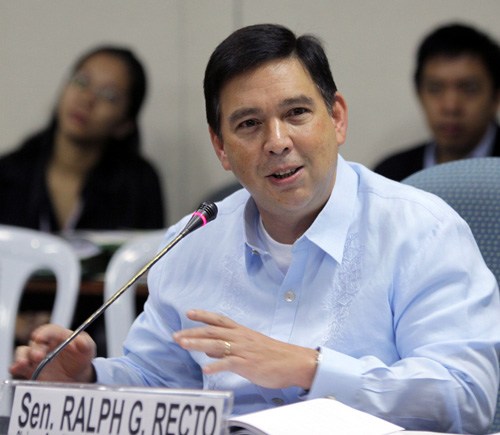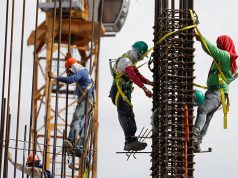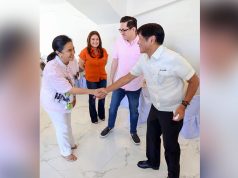MANILA – Senators have one by one come out with statements insisting that the chamber vote separately from the House of Representatives should Congress convene as a Constituent Assembly in order to amend or revise the 1987 Constitution. At the same time, some of them have questioned whether changing the law of the land will solve the nation’s problems, or if it is needed at all.
Senate President Pro Tempore Ralph Recto said, “It takes two to Cha-Cha. Going solo is shadow dancing. Or going up the boxing ring for the 12 full rounds with no opponent and then triumphantly declaring yourself winner by unanimous decision.”
Given that the 1987 “speaks of a bicameral legislature,” the “three-fourth voting formula, to be exercised by one chamber alone, is the wrong calculus,” Recto said.
Article 17, Section 1 of the 1987 Constitution reads: “Any amendment to, or revision of, this Constitution may be proposed by: (1) The Congress, upon a vote of three-fourths of all its Members; or (2) A constitutional convention.”
“If two bodies are needed to pass a bill changing the name of a barangay, then how can one house arrogate upon itself the far more important job of changing the basic law of the land?” Recto added.
POE: AMENDMENTS MUST BE VETTED RATIONALLY
For her part, Senator Grace Poe said that voting separately “will not only ensure that the Senate is not swamped by the 200-plus members of the House of Representatives, but also to ensure that proposed amendments are debated on and vetted rationally.”
She also stressed that before amending the 1987 Constitution, lawmakers must first determine what it is they want to achieve. “Federalism is not a ‘magic pill’ to address all of our country’s problems. If we wanted to strengthen local autonomy, some issues are better addressed through amending the Local Government Code. We need stronger institutions; not strongmen,” she said.
Senator Bam Aquino – the cousin of former President Benigno Aquino III – pushed for the enactment of an anti-dynasty law before revising the charter.
“Intensified political dynasties, even warlordism in some areas, might be a drawback of a federal form of government,” he said in a statement, adding that the passage of an anti-dynasty law will enhance the public’s trust in the shift to federalism.
Aquino also previously objected to the House of Representatives’ adoption of House Concurrent Resolution No. 9 on Tuesday to constitute the Senate and the House of Representatives into a constituent assembly to amend or revise the Constitution.
“A process as important as a Constitutional Change cannot be rushed,” his statement read. “A Constitutional Convention process would be more acceptable to the people than a Constituent Assembly composed of politicians.”
KIKO WARNS VS ILLEGAL PROCESS
Senator Kiko Pangilinan also had this warning for the House of Representatives: “Mag-iingat sila sa pwersahang pagtulak sa isang iligal at makasariling cha-cha dahil taumbayan na at hindi lang ang mga senador ang magagalit (They should be careful in forcing an illegal and selfish cha-cha upon us because it is the people and not just the senators who will be angered).”
Senator Risa Hontiveros, in her opening statement during the hearing of the Senate Committee on Constitutional Amendments and Revision of Codes on the proposed amendments and revisions to the 1987 Constitution on Wednesday, emphasized, “While the Constitution cannot be static, neither can it be used as a tool to serve the interests of political elite or as a means to the narrow ends of those who want to perpetuate themselves in power.”
She vehemently opposed the revision or amendment of the 1987 Constitution through a Constituent Assembly, especially since “the promise of term extension is being dangled as carrots to legislators.”
“How can we trust legislators to be objective? How can we be sure that a sober perusal and assessment of the provisions of the Constitution will be undertaken with the No-El elephant in the room?” Hontiveros asked. “I have my doubts on the capacity of this administration to carry out an inclusive, democratic process for Charter Change. Ngayon pa lang (Even now), we are force-fed their brand of federalism that raises a lot of problematic issues, and do not seem to value people-led and participatory fiscal processes.”
She concluded, “It is very clear that the agenda of amendment is to facilitate the transition to PDP-Laban’s brand of federalism, which will impact greatly on term limits and the composition of the legislature, including the present legislature. For these reasons, a Constitutional Convention is our best step forward.”
GORDON: BUT DO WE NEED CHA-CHA AT ALL?
Senator Richard Gordon said that the lawmakers must first find out whether there is a need to amend the 1987 Constitution in the first place.
“What this country needs is not just a change of men, but a change in men. Perhaps our attitude is what brings it down,” he argued.
Senator Joel Villanueva also said, “As a legislator, I would like to know what are the problems a Constitutional amendment is trying to resolve. I think we should have a national consensus on what these issues and principles are. Are these problems unsolvable without Charter Change or federalism?”
Meanwhile, Senate Minority Leader Franklin Drilon cited former Chief Justice Reynato Puno, one of the resource persons of the Senate Committee on Wednesday, as saying the Supreme Court “cannot interfere in the process of amending the constitution and how the constitution should be amended, because this is a political exercise and a political question, beyond the jurisdiction of the Supreme Court.”
Puno had been responding to Drilon’s question about whether the Supreme Court can compel the Senate to act on the House resolution calling for a constituent assembly.
Drilon also believed both houses should vote separately, and said in an interview afterwards that there was a consensus among the senators that they should vote separately.










